HIV diagnoses at lowest level since 2000 thanks to testing and prevention efforts

The number of new HIV diagnoses in the UK has fallen by almost a third since 2015 and is at its lowest level since 2000, figures by Public Health England have revealed.
Data has shown there were 4,484 new diagnoses of HIV in 2018 compared to 6,271 in 2015 – a decline of 28%.
PHE said this was due to ‘enormous’ testing and prevention efforts in the UK.
Diagnoses have fallen in both gay and bisexual and heterosexual populations, according to PHE data. However, the steepest falls are among gay and bisexual men where there has been a 39% decline since 2015.
Within that group, the biggest decline has been among gay and bisexual men living in London and those between 15 and 24, with diagnoses decreasing by 50% and 47% respectively.
Between 2015 and 2018, new HIV diagnoses amongst heterosexual populations fell by by 24%.
However, PHE has said the challenge in early diagnosis remains. Over 40% of new diagnoses in 2018 were at a late stage of infection, which increases the risk of death within one year by ten-fold.
The decline has been put down to HIV prevention policies over the last decade, including HIV testing, condom provision, the increased use of pre-exposure prophylaxis (PrEP) and anti-retroviral therapy (ART) drugs that maintains the low level of HIV in the body and prevents the virus from being passed on.
PHE head of HIV surveillance Dr Valerie Delpech said: ‘It is thanks to the enormous testing and prevention efforts in the UK that we are seeing further declines in new HIV diagnoses, which have now reached their lowest in almost 20 years.
She added: ‘Getting tested for HIV has never been easier, with free tests available through GP surgeries, local hospitals and sexual health clinics, as well as through a self-sampling service or by using a self-testing kit. Early diagnosis means early effective treatment, which can prevent you passing on HIV.’
Public health minister Jo Churchill said: ‘This decline in diagnoses is a result of our unwavering commitment to prevention which has led to more people getting tested and has allowed people with HIV to benefit from effective treatment, stopping the virus from spreading further.
‘However, I am not complacent and remain dedicated to ensuring we reach our target of zero new HIV transmissions by 2030.’
It comes as researchers suggested GPs need more than one-off training sessions to encourage them to offer more HIV tests.
Visit Pulse Reference for details on 140 symptoms, including easily searchable symptoms and categories, offering you a free platform to check symptoms and receive potential diagnoses during consultations.









